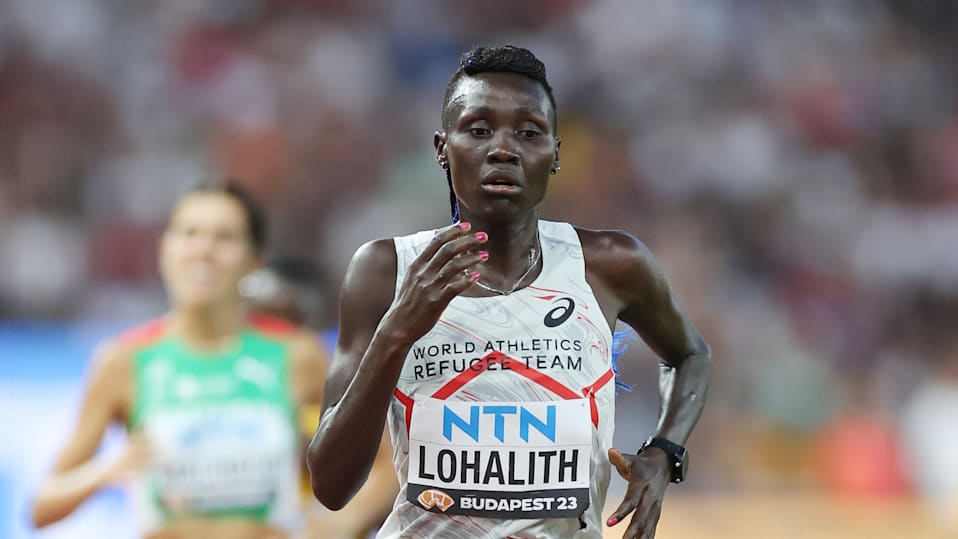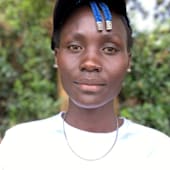IOC Refugee Olympic Team athlete Anjelina Nadai Lohalith: ‘Barriers are tools that make me stronger’
The South Sudanese born runner and two-time Olympian became the first Refugee Olympic Team member to win an international athletics race in 2023.

When Anjelina Nadai Lohalith crossed the finish line first at the 2023 European Championships Clubs Cross Country in Spain, a thousand thoughts raced through her head. Most concerned her family, her status, the gruelling hours of training, but mostly she thought of fellow refugees, who like her have suffered the stress and difficulties of displacement.
As intense as it was, it also led her to some of the happiest moments in her traumatic life. The child refugee from Kenya became the first-ever refugee in athletics to win an international race.
“It was so amazing,” she told Olympics.com in Budapest, where she was competing at her third World Championships.
“I felt like I really represented the refugees well. I also dedicated my win to all refugees to give them hope that they can really make it, it doesn't matter how hard their current or past situation is.”
The 28-year-old is among 63 scholarship-holders who are part of the Refugee Athlete Support Programme, which is managed by the Olympic Refuge Foundation and funded by Olympic Solidarity.
The athletes are looking to qualify for the Games and compete as part of the IOC Refugee Olympic Team at Paris 2024.
“With the support we have from the IOC, World Athletics, UNHCR, I decided to take the opportunity to improve myself as a runner. I want to train hard and find myself in a new version. I have the talent, I just need to take the chance.”
Angelina Nadai Lohalith’s incredible journey continues
When Lohalith left home one day with her aunt as a six-year-old, she didn’t think it would be the last time she would see her parents in nearly two decades. They fled their war-torn nation and built a new life at the Kakuma Refugee camp in Kenya.
The young girl embraced her new home and, years later in high school, began running. Lohalith entered a 10km run, from where she was identified by the Tegla Loroupe Foundation to train for the first-ever IOC Refugee Olympic Team at Rio 2016. She competed there, and made the team again for the Tokyo 2020 Olympics.
Her historic Olympic journey will remain in her heart forever for another reason too: it was during this time that she was reunited with her parents.
“After I came back from Tokyo, I met them for the first time after 18 years at the Kakuma Refugee Camp, where they had also now settled. It was such a happy moment after living for so long not knowing whether they were still alive,” she said in an interview with Olympics.com.
These happy moments injected a new impetus into her running, and helped the 28-year-old return to the sport even stronger after giving birth to her first child in 2018.
“I'm no longer the same person I was in 2016. 2016 was a beginning for me, and so many things were so new, like being introduced to the idea of a training camp and different foods,” Laholith explained to Olympics.com
“Many times, I tell myself, ‘If other athletes can train and win, what about me?’ They are human like me. What do I lack? It doesn’t matter my status, as a refugee, it’s not something that can put me down.’ - Angelina Nadai Lohalith to Olympics.com.
“We need to show that displacement doesn’t mean the end of our dreams, goals or talent. We can still achieve it whenever we are, we just need the opportunity.”
2023: Another unforgettable year for Anjelina Nadai Lohalith
It’s with that mentality that the 1500m specialist opened her 2023 season.
Competing for Tel Aviv’s Alley Runners Club, where she trains alongside other refugee athletes, Lohalith pulled away on the penultimate lap of the tricky 8.7 km course to secure the biggest win of her life.
Even more impressively, that was her first time competing in an elite event in a distance longer than 5,000m.
Her fantastic season continued in July where she secured the 5000m title at the Meeting National à thème de l'Est Lyonnais in France.
“I believe that I'm more capable of a lot more, no matter the challenges I face in life or while training,” she said.
“Every time, I try to turn the barriers I face, into tools that make me stronger. I’m always ready to learn and to change if it is possible. I am always telling myself, ‘I can do it, get better and better’!”
Anjelina Nadai Lohalith: Inspiring other refugees
Despite this success, it is not all about winning races and running faster for Lohalith. It’s also about motivating refugees worldwide that they too can turn their pain and disappointments into excellence.
“I feel like a role model” she continued. “I’m their ambassador. Anything I do, I need to be a good example to the refugees because I have the same background they have.
“Like last time when I went to the camp, I met with some of my colleagues who have been training. Kakuma Refugee camp is the home of talent, but they only began training after we went to the Olympics in 2016.
“They have seen how I'm performing, how I am travelling, and then they feel like they should be part of it. They ask me, ‘How do you really make it to get there?’ I tell them, ‘You need to train even harder and put more effort and the support will come to you’.”
There’s an air of confidence around Lohalith as the Paris 2024 Olympics approach**.** After her third World Athletics Championships in Budapest and her debut at the last World Cross Country in Bathurst, she is determined to make the roster for Paris.
“The main goal is if most of us to go there to represent the rest. And even if I don’t make it I know one of the Refugee Athlete members will go there and represent the rest.”
Currently, she is among the 63 athletes from living in 23 host countries and representing 13 sports, who are on scholarships that cover their basic living and training expenses.
“It's really changed me personally. I have managed to go to school and to do my diploma in community and social work,” she said proudly.
“This is something that when I finished high school, I didn’t think I would manage. Because I don't have a family who are capable of supporting me.”
She is happy to be on the path to a second career outside of track.
“I always dreamt of being a doctor because I know when you are a doctor, you can save someone's life and serve many people. That’s why I chose Community and Social work. I want to go and give back to the community.”

IOC Refugee Olympic Team member Anjelina Nadai Lohalith on how she is using barriers as tools in her running journey.
The UNHCR estimates that more than 110 million people are currently displaced worldwide as a result of persecution, war, violence, or human rights violations.
Lohalith and the other refugee athletes are a constant reminder of the real people attached to the growing numbers. She hopes that her athletics career can continue to inspire the displaced.
“Don't let the past destroy you. Use the past to build you, to develop you, to make you a different person. Don’t dwell on the past, use it to build you, to develop you, and make you a different person,” she shared.
“There’s no situation which is permanent. Always try to get up, push yourself. If there is any opportunity, grab it.
“Do not lose hope in life. Never give up on the hope that the situation in our countries will improve so that we can go back and have a place to belong, where we can call home.
Sport unites the world and it helps ease the pain we may have. Helps us create new relationships and know the world."






